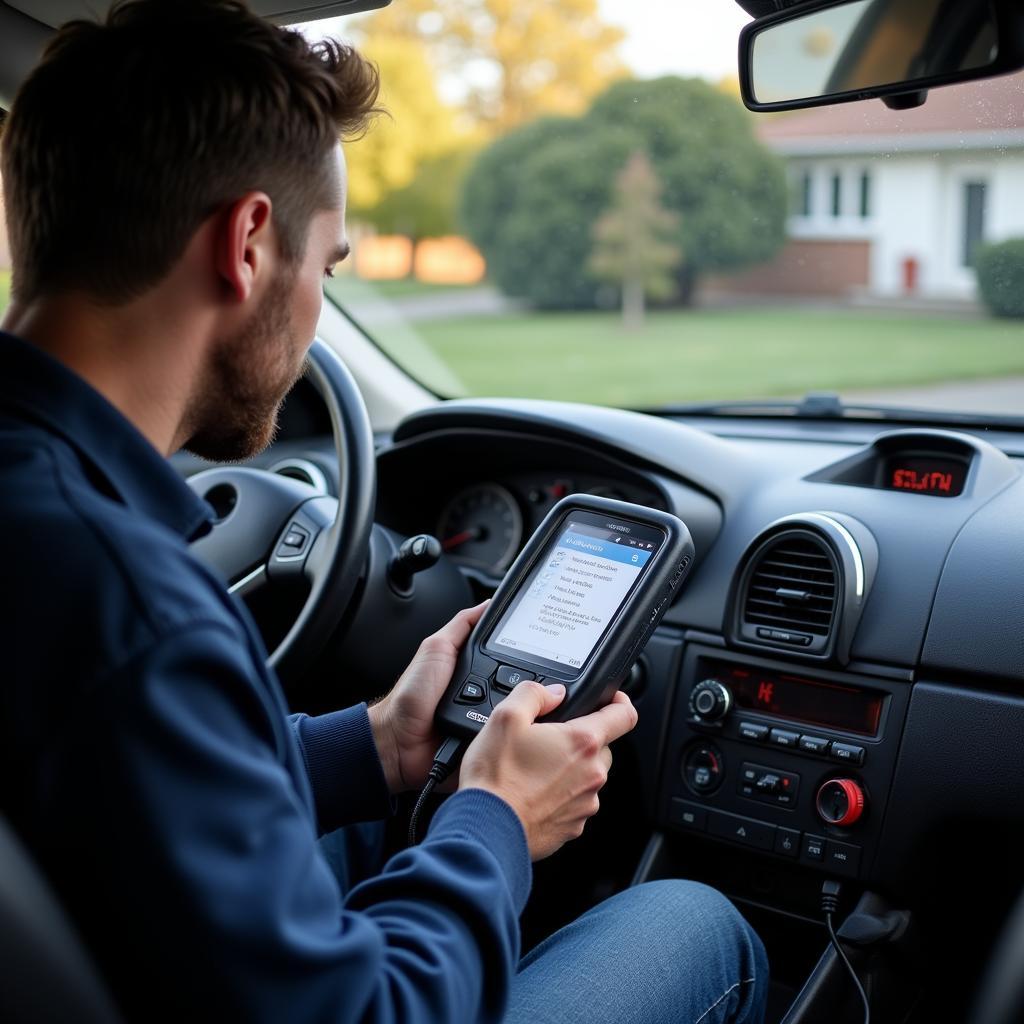When your car starts acting up, understanding what’s wrong can feel like deciphering a foreign language. That’s where car diagnostic tests come in. These tests, performed by trained technicians, act as a window into your vehicle’s internal systems, revealing issues that need attention.
But who exactly are these “car doctors” who can translate engine whispers into understandable diagnoses? This article will delve into the world of car diagnostic tests, exploring who performs them, their importance, and how they benefit you.
The Professionals Behind the Diagnostics
Several types of professionals perform car diagnostic tests, each with varying levels of expertise:
- Mechanics: These skilled professionals are often the first line of defense when a car acts up. They use diagnostic tools to pinpoint the cause of common problems.
- Auto Electricians: Specializing in a car’s electrical system, they use advanced diagnostic equipment to diagnose issues with wiring, sensors, and electronic control units.
- Dealership Technicians: Trained specifically on your car’s make and model, dealership technicians possess in-depth knowledge and access to specialized diagnostic software.
- Mobile Mechanics: These convenient professionals bring the diagnostic tools to you, offering flexibility and on-the-spot assessments.
 Mobile Mechanic Performing Diagnostic Test
Mobile Mechanic Performing Diagnostic Test
No matter who conducts the diagnostic test, they utilize specialized equipment, primarily the OBD-II scanner, to communicate with your car’s computer system.
Why Are Car Diagnostic Tests Crucial?
Gone are the days of mechanics relying solely on intuition and experience. Today, car diagnostic tests are indispensable for several reasons:
- Accurate Diagnosis: Modern vehicles are complex machines controlled by intricate computer systems. Diagnostic tests read data from these systems, providing accurate information about the problem.
- Time and Cost Savings: Pinpointing the issue early prevents unnecessary repairs and replacements.
- Increased Safety: By identifying potential problems before they escalate, diagnostic tests ensure your vehicle is safe to drive.
- Improved Vehicle Performance: Addressing underlying issues through accurate diagnoses can lead to smoother running, better fuel efficiency, and a longer lifespan for your car.
Understanding the Importance of Professional Diagnostics
While DIY car repair enthusiasts might be tempted to purchase their own OBD-II scanners, there are significant benefits to seeking professional car diagnostic tests:
- In-depth Knowledge: Professional technicians undergo extensive training and possess the knowledge to interpret the data from diagnostic tools accurately.
- Advanced Equipment: Professionals have access to more sophisticated and up-to-date diagnostic equipment that can delve deeper into your car’s systems.
- Experience and Expertise: Experienced technicians have encountered a wide range of car problems and can use their expertise to diagnose complex issues.
Remember, while a basic OBD-II scanner might tell you there’s an issue with your engine, a professional can identify the specific problem and recommend the best course of action.
Choosing the Right Diagnostic Professional
Finding a trustworthy professional to perform car diagnostic tests is crucial. Here are some factors to consider:
- Reputation: Look for well-established businesses or individual mechanics with a track record of reliable service.
- Specialization: Consider the specific issue you’re facing. If it’s electrical, an auto electrician might be the best choice.
- Cost Transparency: Choose a professional who provides clear and upfront pricing for their services.
 Mechanic Discussing Diagnostic Report
Mechanic Discussing Diagnostic Report
Asking for recommendations from friends, family, or online communities can also help you find a reliable professional.
Taking the Mystery Out of Car Trouble
Car diagnostic tests, performed by skilled professionals, are essential for keeping your vehicle running smoothly and safely. By understanding the importance of these tests and choosing the right professional, you can demystify car trouble and ensure your car stays healthy for miles to come.
Ready to learn more about car diagnostic software and how it can help you? Check out our articles on how to learn car diagnostic software and what is the best car diagnostic software.
Frequently Asked Questions
1. How much does a car diagnostic test cost?
The cost varies depending on the provider, location, and complexity of the issue. A basic diagnostic test can range from $50 to $150.
2. Can I do my own car diagnostic test?
While you can purchase OBD-II scanners for personal use, professional diagnostics are recommended for accurate results and effective solutions.
3. How often should I get a car diagnostic test?
It’s generally recommended to have your car checked at least once a year or when you experience any unusual car behavior.
4. Can a diagnostic test tell me everything that’s wrong with my car?
While comprehensive, diagnostic tests might not detect every issue, especially mechanical problems that don’t trigger error codes.
5. What is the OBD-II port and where can I find it?
The OBD-II port is a standardized connector found in most cars manufactured after 1996. It’s usually located under the dashboard on the driver’s side.
Do you have more questions about car diagnostic tests or need help finding a reliable professional in your area? Contact us via WhatsApp: +1(641)206-8880, Email: [email protected]. Our team is available 24/7 to assist you.

Leave a Reply